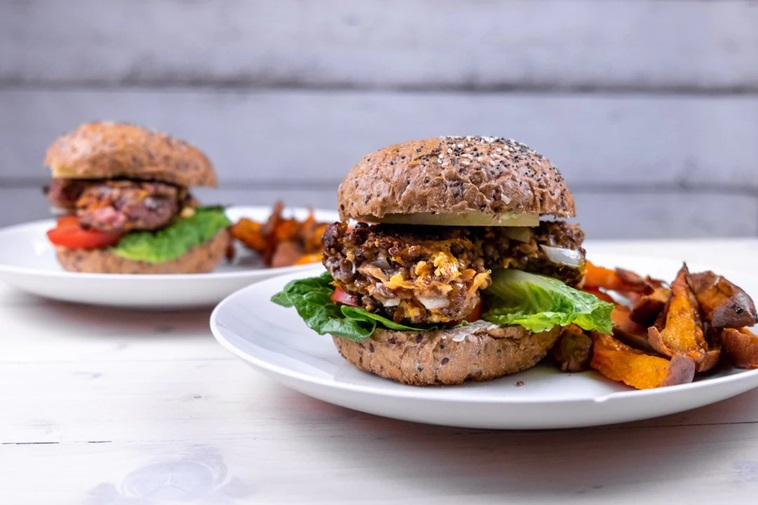How to support physical activity on a plant-based diet
Following a plant-based diet can be a fantastic way to support your overall health and wellbeing.
Eating more fruits, vegetables, wholegrains and eating less red meat or processed meat can reduce our risk of developing cardiovascular disease.¹ However, there are a few key nutrients we should take careful consideration of when following a plant-based diet, particularly when it comes to supporting an active lifestyle.
Benefits of a plant-based diet
A well balanced, plant-based diet can have multiple benefits for our health. Fruits, vegetables, and wholegrains all contain fibre, which promotes good gut and bowel health. Consuming a fibre rich diet and engaging in a form of exercise every day is a great way to support your digestive wellbeing.²
Meals that are plant-based can often be less energy dense than meals that contain processed meat (like salami, sausages or ham), which can also help promote a healthy weight when combined with regular exercise. While there are many benefits to following a plant-based diet, there are a few key nutrients that we need to be mindful of not missing out on.
Key nutrients to consider
Vitamin B12 is an important nutrient for nerve function, the formation of red blood cells and cell metabolism and is mostly found in animal products.³ Vitamin B12 is also found in dairy and dairy products, however if you follow a vegetarian diet that does not include dairy, you may be lacking in vitamin B12. Vitamin B12 deficiency can cause symptoms such as fatigue, shortness of breath and lowered exercise tolerance, highlighting the importance of B12 in supporting an active lifestyle.³ If you’re concerned about your vitamin B12 levels, make an appointment with your doctor.
Iron is also an essential nutrient to support an active lifestyle, as it helps transport oxygen to all the cells in our body.⁴ When we become iron deficient, we can often feel fatigued and short of breath. Iron is mostly found in animal foods, so it’s important to ensure we’re eating iron rich plant-based alternatives when following a plant-based diet. Legumes, beans, tofu, nuts, lentils and wholegrains are all great sources of plant-based iron. Plant based sources of iron are not as well absorbed by the body as animal sources but eating these foods with sources of vitamin C can help absorption.
Plant based eating to support exercise
The best way to support exercise on a plant-based diet is to consume a source of plant-based protein at every meal. Aim to eat a meal or snack containing legumes, beans, tofu, nuts, lentils or wholegrains within an hour after exercising, to give your body the best chance of recovery.
Try our lentil burgers with sweet potato wedges for your next post-exercise meal!

Recipe: Lentil Burgers with Sweet Potato Wedges
Method
- Preheat oven to 180°C.
- Wash sweet potatoes under cold water. Cut into wedges. Arrange on a large baking tray and drizzle with 3 tablespoons olive oil. Cook for 20 minutes in the oven. Turn the potatoes over and roast for another 15 minutes or until crispy.
- Drain the can of brown lentils into a sieve and rinse under cold water. Set aside.
- Peel and finely dice the onion and garlic cloves. Wash and grate the carrot. Add onion, garlic and carrot to a large bowl.
- Add flour and breadcrumbs to bowl. Mix together until flour and breadcrumbs are coating the vegetables. Add egg and brown lentils. Mix until combined.
- Shape mixture into 4 burgers with hands.
- Heat a frypan over medium-high heat and add 1 tablespoon olive oil. Fry lentil burgers for 5-7 minutes on each side or until brown.
- Place lentil burgers on a wholemeal roll with lettuce, tomato slices and cheese. Serve with sweet potato wedges.
Ingredients
- 4 small sweet potatoes
- 4 tablespoons olive oil
- 1 x 400g can brown lentils
- ½ brown onion
- 2 cloves garlic
- ½ carrot
- ¼ cup flour
- ¼ cup breadcrumbs
- 1 egg
- 4 wholemeal bread rolls
- 4 iceberg lettuce leaves
- 1 tomato
- 4 slices cheese
References:
- How does Plant-Forward (Plant-Based) Eating Benefit your Health? ©2022 American Heart Association, Inc. Cited 2022 June 15 [Internet]. Available from: https://www.heart.org/en/healthy-living/healthy-eating/eat-smart/nutrition-basics/how-does-plant-forward-eating-benefit-your-health
- The Better Health Channel. Dietary Fibre [Internet]. Department of Health, State Government of Victoria, Australia © Copyright State of Victoria 2020. Updated 2021 Sep 17 [cited 2022 Jun 15]. Available from: https://www.betterhealth.vic.gov.au/health/healthyliving/fibre-in-food
- Nutrient Reference Values for Australia and New Zealand. Vitamin B12 [Internet]. Ministry of Health. Updated 2018 Jan 31 [cited 2022 Jun 15]. Available from: https://www.nrv.gov.au/nutrients/vitamin-b12
- Nutrient Reference Values for Australia and New Zealand. Iron [Internet]. Ministry of Health. Updated 2014 Apr 9 [cited 2022 Jun 15]. Available from: https://www.nrv.gov.au/nutrients/iron
Last updated: May 27, 2024 at: 1:53 pm
